When I was asked to share my thoughts on what cancer is like from the perspective of a caregiver, I thought back to what life was like with my husband prior to his HPV-derived throat cancer diagnosis, when my care giving consisted of making meals for our family, doing laundry, going to school events, and other typical family care giving activities. To say the least, life was good! Jon was a successful sales and marketing executive who spent a lot of time working, traveling, talking, reading, golfing, exercising, laughing, cooking and generally always having fun no matter the setting or the audience! He was a strong, smart, driven and compassionate man who loved being a husband and father.
As you can imagine, Jon’s cancer diagnosis came as a complete shock! The business trip that was scheduled for the following day was quickly cancelled so we could absorb the news, talk with our son, and begin scheduling appointments with oncologists and surgeons. The countless medical appointments were a blur…so much information to digest, so many possible side effects from the 7 weeks of radiation and 3 chemo treatments that suddenly replaced the spring break trip, work travel, business meetings and family gatherings on Jon’s calendar.
I wasn’t thinking about what the treatment plans were replacing on MY calendar…because I didn’t have cancer, my husband did. However, I quickly learned that my schedule as a caregiver would become dependent not only on Jon’s treatment schedule as a cancer patient, but also on the consequences of that treatment on Jon’s ability to function as he had for the previous 25 years of our marriage.
Absolutely nothing or no one could have prepared me for watching Jon suffer as his entire being was consumed with fighting cancer…from the physical to the mental to the emotional…it was the fight of, and for, his life. As his wife, I was so focused on caring for my him and keeping life as normal as possible for our 16-year-old son, that I was unaware of the physical, mental and emotional toll that cancer would have on me. I would not understand this until well after Jon was back on his feet…when he was able to go on his first business trip after a full year of being “grounded”. While Jon started back to work, and Matthew continued his busy high school schedule, I found myself sitting at home wondering what my purpose was! It felt as though I was no longer “needed.”
For almost a year, Jon NEEDED me! He needed me in a way that I could have never imagined. I never could have imagined my husband being unable to drive or travel, unable to work or think, unable to speak or swallow, unable to parent or be a loving spouse…. basically, unable to participate in life. Putting it bluntly…. treatment sucked! The mental and emotional burden of watching my husband slowly disappear before my eyes was hard….no meals together, no drinks on the deck, no one with whom to discuss the ups and downs of life, no one to help me keep our son’s life as normal as possible when there was nothing normal about it…it was the loneliest time of my life!
Fighting cancer is hard work…for the patient and the caregiver. Jon had an amazing medical team and caregiver (yep…that’s me!) that developed a treatment and care plan to provide him the best opportunity to win the fight. Caregivers, please remember to care not only for your loved one, but also for yourself. The better you care for yourself, the better care you can give to your loved one. We caregivers are stronger than we think…but we should never think we are so strong that we don’t ask for, or accept, help from others. People want to help…so let them! Let them feed you, shop for you, sit with your loved one while you sleep or shower or exercise or go to church or have lunch with a friend, or do whatever it is that fills your bucket.
Speaking from experience, I underestimated the value of self-care. It was hard to think about leaving Jon, even for an hour, when he needed me more than he ever had. I promise that you will be a better caregiver if you take time for you. It is not selfish…it is necessary! It will allow you to move forward when they don’t “NEED” you anymore because they are able to go back to living their lives.
Kris Scharingson is a graduate of Central College in Pella, Iowa and Iowa State University. She is currently serving as the Volunteer Chair of the ACS HPV Cancer Free Volunteer Work Group and is serving as the sponsorship chair for the Relay for Life of Ankeny. Kris and her husband Jon have been married for 27 years and have a 19 year old son Matthew and a 12 year old puppy named Griffey.
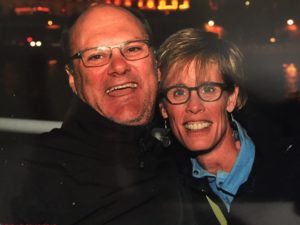
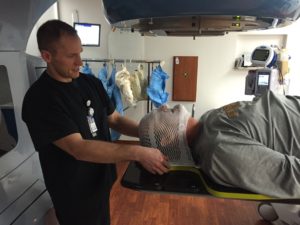
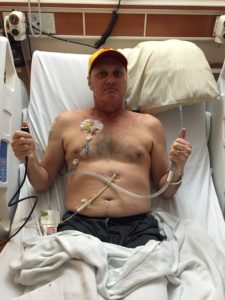
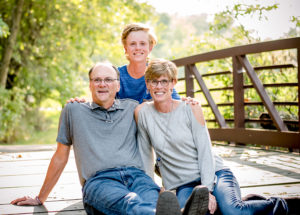
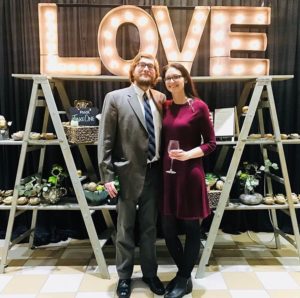
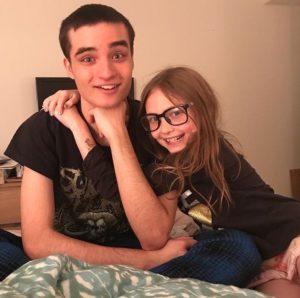 Helping the kids was easier. Our teenager was zealously optimistic. He knew with the certainty of youth that his mom would be fine. I was jealous. Our daughter, on the other hands, buries her emotions (like her dad), so comforting her took some effort. Once she was ready to talk, she appreciated the reassurance, but until then I just told her it would be okay and trust that the words made it into her ears.
Helping the kids was easier. Our teenager was zealously optimistic. He knew with the certainty of youth that his mom would be fine. I was jealous. Our daughter, on the other hands, buries her emotions (like her dad), so comforting her took some effort. Once she was ready to talk, she appreciated the reassurance, but until then I just told her it would be okay and trust that the words made it into her ears.